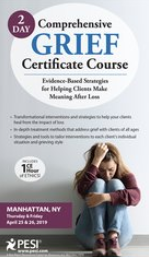Joy R. Samuels – 2-Day Comprehensive Grief Certificate Course
$300.00 Original price was: $300.00.$113.05Current price is: $113.05.
Available for Pre-Order. This product will be available within a few days.
Joy R. Samuels – 2-Day Comprehensive Grief Certificate Course
Your client’s world has been shattered following the loss of a loved one. Not only are they adjusting to these days and weeks without that person, but they are also struggling with changes to their sense of self. Who are they now as they navigate this new world? Your client is stuck in a place of paralyzing sorrow, and you’re unsure of what else to do to help.
You can transform the way you treat grieving clients with the tools and strategies you’ll learn in this 2-day Comprehensive Certificate Course!
Watch Rev. Dr. Joy Samuels, LPC-MHSP, NCC, as she leads you through the process of working with bereaved individuals and aiding them with making meaning after loss. You’ll learn evidence-based counseling strategies appropriate for the treatment of multiple types of losses, including non-death losses, and grieving styles. In addition, you’ll acquire the skills you need to tailor clinical interventions to the uniqueness of each client’s grief experiences
Watch this certificate course recording, and you’ll learn how to guide your clients through making meaning after loss – drastically increasing their well-being and reducing symptoms of complicated grief. You’ll walk away with the tools you need to help your clients live fulfilling lives after loss.
- Explain relevant theories and models describing the physical and psychosocial effects of loss, grief and mourning on the individual and family system and their clinical implications.
- Articulate how to plan and implement appropriate assessments, interventions and strategies to help individuals and families cope with loss and grief to improve treatment outcomes.
- Perform a clinical assessment to inform the clinician’s choice of best treatment interventions for the reduction of symptoms of complicated grief, disenfranchised grief, or Persistent Complex Bereavement Disorder.
- Differentiate potential loss events occurring throughout the lifespan, including non-death situations, to inform the clinician’s choice of treatment interventions.
- Analyze the ethnic, gender and cultural factors that affect individual responses to loss-related situations as it relates to case conceptualization.
- Compare factors that influence normal and complicated reactions to dying and grief in clients.
- Examine one’s own cognitive, affective and behavioral reactions to death, dying and bereavement, as it relates to professional practice with clients experiencing grief and loss.
- Identify theories and models of individual, cultural, couple, family and community resilience in relation to assessment and treatment planning.
- Analyze the efficacy of various treatment interventions for complicated grief to improve clinical outcomes.
- Scrutinize the ethical and legal issues in end-of-life decisions, such as suffering, dying and choice, and their clinical implications.
- Utilize clinical strategies to assist grieving clients in the move from flight or fight to social engagement in session.
- Utilize the co-regulating pathways of the social engagement system in session as an approach to managing symptoms of complicated grief.
Types of Grief & Their Implications for Treatment
- Disenfranchised grief
- Persistent Complex Bereavement Disorder
- Traumatic bereavement
- Complicated Grief
- Common trajectories for grief
- Recognize complicated grief
- Risk factors for complicated grief
- Treatment Interventions
- Types of Loss & Their Impact on Grieving
- Parental loss
- Child loss
- Widowhood
- Non-death losses
Assessment: Intake Considerations for Grieving Clients
- Current conceptualization models
- Recognize different expressions of grief
- Factors impacting the grief experience
- Assess for depression and suicide ideation
- Differentiate between depression, grief & PTSD
- Use of Adjustment Disorder diagnosis with grief clients
- Determine how the client understands their grief narrative
- Persistent complex bereavement disorder
- DSM-5® changes to Major Depressive Disorder
- Take home assessment tools
Cultural Considerations for Grief Treatment
- Cultural factors affecting expression of grief
- Impact on mourning practices
- Culture’s impact on death anxiety & meaning of life
- Determine where the identity emphasis lies
- Cultural values regarding emotional expression and disclosure
- The impact of society on grief
Grief Treatment: Interventions & Strategies to Improve Clinical Outcomes
- Assist clients with expressing their pain
- Integrate a new inner image of the deceased
- Client self-assessment strategies for coping
- Foster client relaxation skills
- Let the client lead: Starting point, story & stopping point
- Cultivate acceptance
- Elicit emotional availability in clients
- Give clients “permission” to not share stories
- Focus on planning – not positivity
- Develop healthy grief rituals
- Target guilt due to stopping grief rituals
- Build a bridge between memories, current behaviors & underlying values
- Help clients accept the finality of the death
- Navigate the treatment of multiple losses
Would you like to receive Joy R. Samuels – 2-Day Comprehensive Grief Certificate Course ?
In-Session Activities: On-the-Spot Interventions to Facilitate Healing
- The client “influence of loss” chart
- Use loving kindness meditation to build self-compassion in clients
- ”Who am I?” exercise
- Utilize client letters to self
Grief Across the Lifespan: Help Your Clients Heal at Any Developmental Stage
- Developmental considerations & milestones related to loss reactions for:
- Children
- Adolescents
- Early adulthood
- Middle adulthood
- Later adulthood
Grief & the Family: Guide Families Through Healthy Grieving
- Family systems theory: Family influences on individual grief
- Variables that complicate family adaptation
- Strategies to guide family adaptation to loss
- Develop respect for different grieving styles
- The role of gender norms
- ”Family coat of arms” activity
Professional Issues: Ethical Considerations for Working with Grieving Clients, Their Families & the Terminally Ill
- Ethical dilemmas that confront the terminally ill
- Ethical principles of end-of-life decisions
- The clinician’s role in addressing psychological suffering & needs of the terminally ill
- Impact of cause of death on social isolation
- Identify the core values and principles of professional ethical behavior
- Boundaries of professional competence
Be the first to review “Joy R. Samuels – 2-Day Comprehensive Grief Certificate Course” Cancel reply
Related products
NLP - Self-help - Dating
NLP - Self-help - Dating
NLP - Self-help - Dating
NLP - Self-help - Dating
John Overdurf – 24 Courses Collection | Self Hypnosis, HNLP Coaching, Deep Trance, …
NLP - Self-help - Dating
NLP - Self-help - Dating
Dr. Bradley Nelson – The Body Code System 2.0 (Complete) + BONUS
NLP - Self-help - Dating
NLP - Self-help - Dating













Reviews
There are no reviews yet.